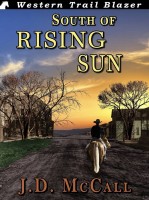South of Rising Sun
Genre: Western
By: J.D. McCall
By Guest Reviewer, John Sposato

I don't read a lot of westerns - but I have a friend who does. So I invited him to read and review this newly published novel about the Old West. From what I could observe, he buried his nose in the book for a solid three days, so it must have been purty good.
Here, then, is his review:
Those of us who are from my generation (and from reading this you will be able to guess just what time frame that is) grew up sitting on the floor watching TV. For a long time, we had only two channels to choose from—then it was like going to heaven when we obtained a third. As a young boy, my favorite shows were the westerns. I was awake every Saturday morning by 7am to watch “Western Jamboree,” which was a rebroadcast of western movies from the recent past, usually “B’s.” All during the week we were treated to Gunsmoke, Paladine, Wyatt Earp, Maverick, The Rebel, Bonanza, and many others. It seemed for a while that Westerns dominated the airwaves. None of these shows glorified the criminal or outlaw, but rather the lawman or another type of good guy. Basically it was always the formula of good over evil, the winning and restoration of law and order over lawlessness— that crime does not pay and that the bad guys always get caught. South of the Rising Sun brings me back to that time. The main character, Federal Marshal Al Taggert, represents the hero that we had easily recognized so many times within a familiar story.
The story takes place in a town called Lecompton in the
recently-admitted state of Kansas; the time is at beginning of The Civil
War. There is animosity between the free-soilers and the pro-slavery
factions and the general populace is concern about the war reaching that far
west. Taggert has a dilemma: he is a federal marshal who must uphold
federal laws, including The Fugitive Slave Act, and he feels he must do what
his consciences deems best. He happens to become involved in a
situation where he has to enforce that unsavory law, but instead chooses to
help a runaway become a free citizen in Canada. This scenario reveals the
author’s point of view, while providing us some pleasant relief from the main
story line, and later a tragic event.
Taggart has been become engaged with the pursuit of cattle
rustlers at the request of the victim rancher. Taggart becomes increasing
more perplexed with his investigation with the lack of evidence and with things
seem illogical. He often becomes distracted with other situations that requires
his immediate focus and further hampered by other illogical obstacles like the
weather and hostile animals. The story evolves in an unusual manner, especially
when we learn how the crime has been committed, who is behind it and how it is
solved. I doubt that this novel will ever compete with those of Zane Grey,
but the author neatly ties all of the story lines together in the end.
Throughout the book Taggart gives Jerome (the runaway slave he is harboring),
and Ben (the son of the crime victim/host), many lessons about life through his
philosophizing, moralizing and story-telling.
Taggart pays a dear price as he chases the criminals, which
eventually leads to the solving of the crime and their capture, but with that
exception, the story is a pleasant tale of episodes and happy dialogue (a bit
lengthy at times - though my personal jury is out on this; people did speak at more length and with more eloquence 100+ years ago) and ends happily for all with Taggart riding off in the
horizon.
While, as I noted, the writer won’t necessarily knock Zane Grey off
his perch, it is a pleasure to return to those days of yesteryear, and relish a
Good Guys vs. Bad Guys tale, set in a well-researched and well-realized Old West.
Not a bad way to spend a couple of chilly winter evenings by the fire.

Comments